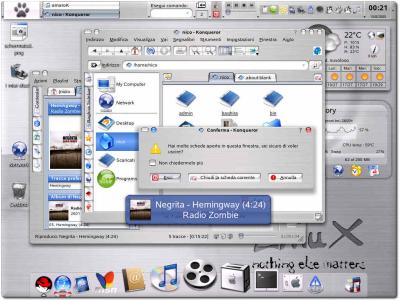GNOME on Linux Outvistas Windows Vista

The dentiny of Longhorn?
 truly enjoy a good Linux screenshot. Here is a nice OS X-type menubar, as well as a showcase for Composite transparency in X server. The menus are a brand-new GTK modification.
truly enjoy a good Linux screenshot. Here is a nice OS X-type menubar, as well as a showcase for Composite transparency in X server. The menus are a brand-new GTK modification.
Move over to another operating system (Windows Vista under a Linux hypervisor) and find that there still appear to be many problems with the latest beta. It’s a good thing that Microsoft does not name/label its operating systems by the year. With all these delays, this could become very embarrassing and confusing. And I also found the following article this morning.
“I have been testing Microsoft operating systems since Windows 95, and this is the buggiest OS I’ve seen this late in development,” says Joe Wilcox, an analyst with Jupiter Research. “Look at the older operating systems, and by Beta 2 there is a stable foundation on which the [independent software vendors] can build. Right now, Vista is like a ship on stormy seas.”






 Filed under:
Filed under: 

 NOTHER short Linux comparison has taken my attention. It is by no means a professional or comprehensive review, but is does provide a ‘taste’ of two ends —
NOTHER short Linux comparison has taken my attention. It is by no means a professional or comprehensive review, but is does provide a ‘taste’ of two ends — 

 EVERAL years ago I foresaw the demise of Windows, especially when I was first introduced to Linux. Years later to find myself sought after by companies like Google, whereas giants like Microsoft only seem to offshore their job market as to cut margins and sustain stable figures.
EVERAL years ago I foresaw the demise of Windows, especially when I was first introduced to Linux. Years later to find myself sought after by companies like Google, whereas giants like Microsoft only seem to offshore their job market as to cut margins and sustain stable figures.